

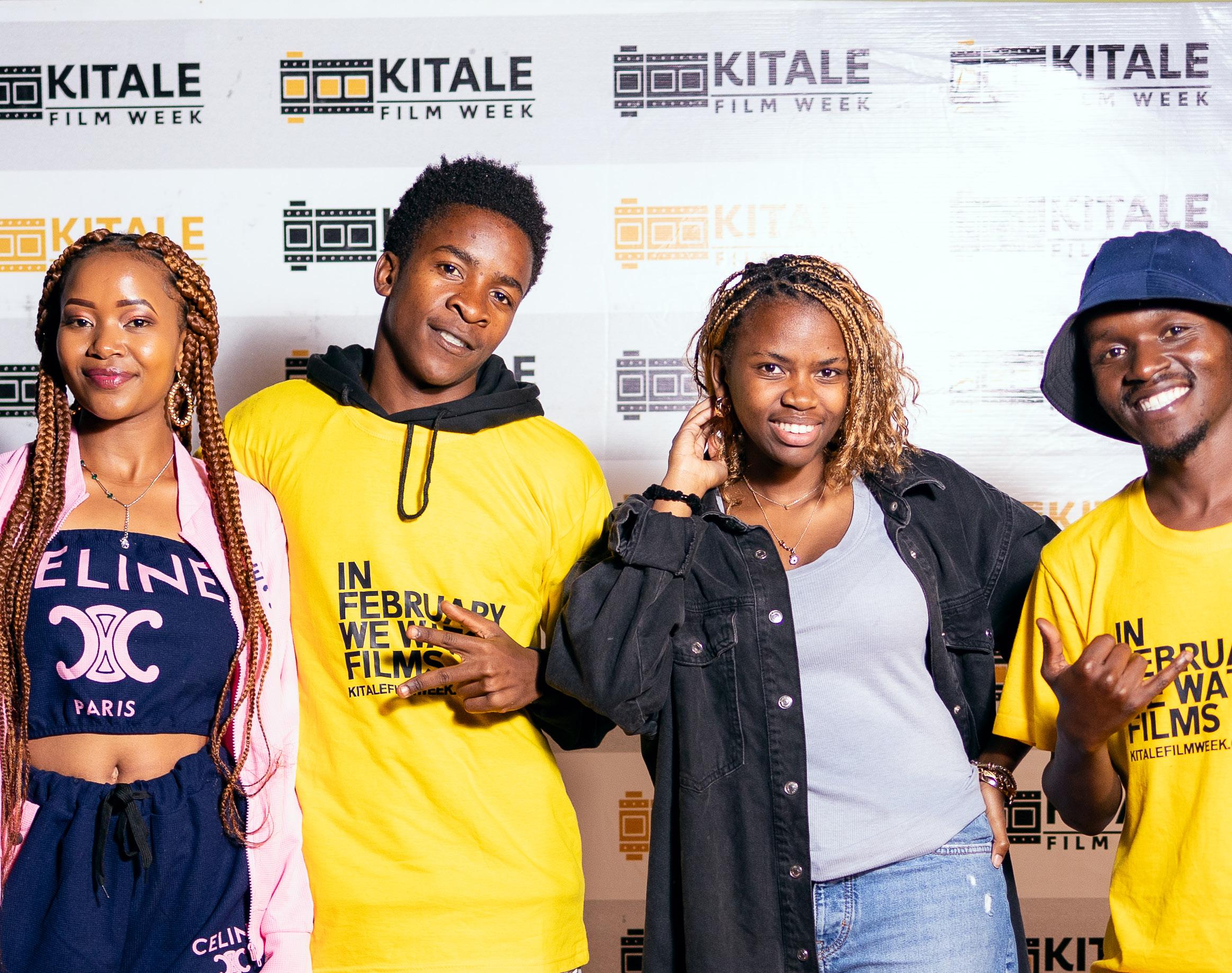
KITALE FILM WEEK
2024 REPORT
22nd April 2024
W: kitalefilmweek.org
M: +254 735 128 548
E: info@kitalefilmweek.org
kitalefilmweek@gmail.com

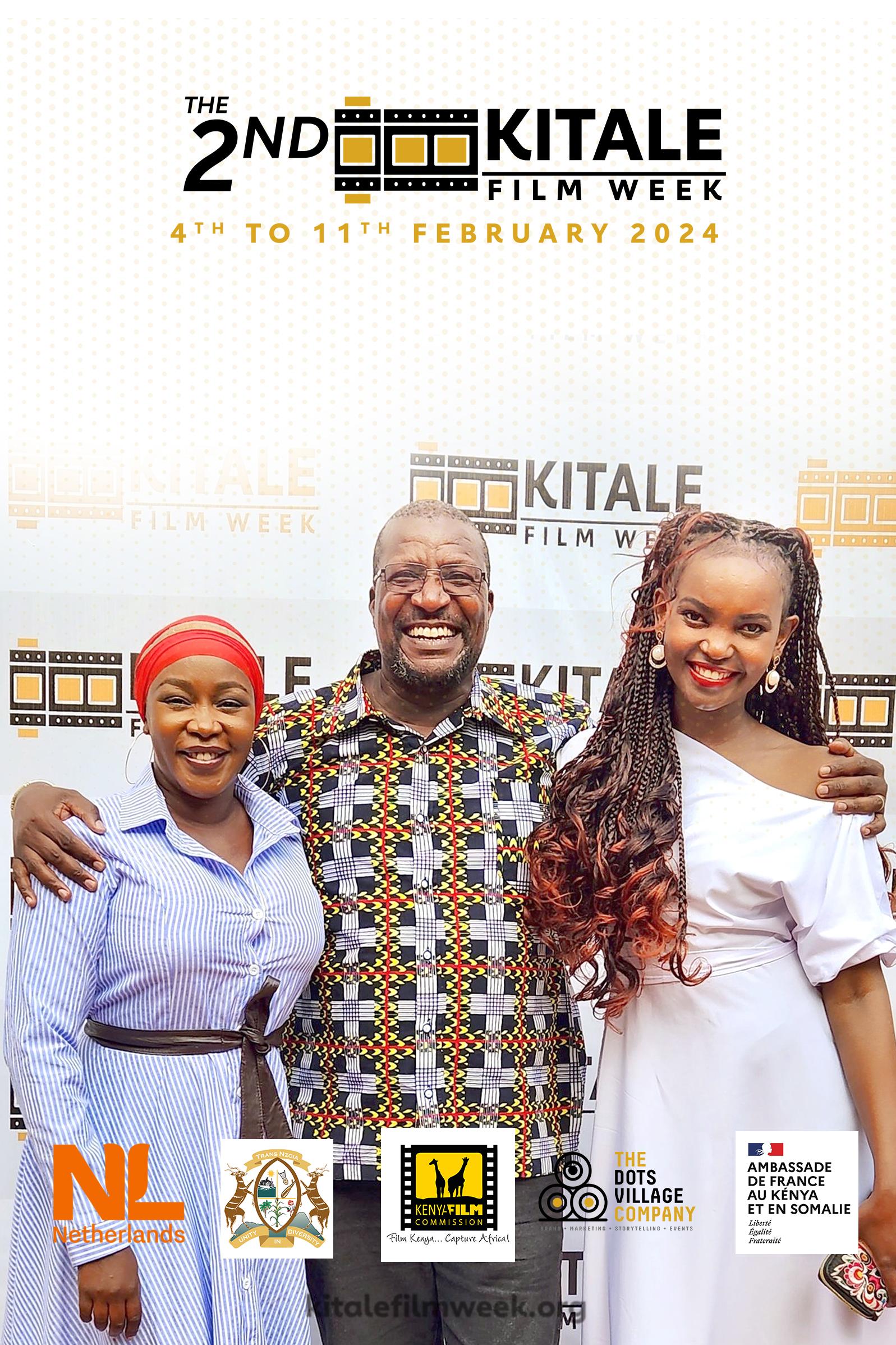



/SUMMARY/
The Kitale Film Week is an 8-day film festival that aims to position film as a strategic factor for sustainable development in Trans Nzoia. The festival organisers include a mixture of young men and women, mostly born and bred in Kitale, some of whom have worked at the top of the film industry in Kenya and abroad. The main reason for this is the need for knowledge transfer from the higher to the mid and low cadre of filmmaking in the region and even across the border.
The main events in the festival include film screenings which have been integrated with conversations on filmmaking and some key community issues and are moderated by local filmmakers, media personalities and students from Kitale; school film events geared towards developing filmmakers and film critics from primary and secondary school level; filmmaking workshops with top industry professionals seeking to develop socially engaged filmmakers locally; and an ambitious short film fund which the festival hopes can help two projects by upcoming local talent to get produced in Trans Nzoia.
The film week also involves a competition for top awards open to Kenyan and Ugandan filmmakers to enhance artistic collaboration between western Kenya and Kampala. Future plans include extending the festival to South Sudan filmmakers, further integrating community development issues in the film spaces, and a push to get Kitale to become a UNESCO creative city for film.
The Kitale Film Week is also positioning itself as a premier tourism attraction in the coming years to spur a ripple effect on the growth of other local industries.
website: kitalefilmweek.org
/2024 BY THE NUMBERS/
Days: 8
Total Reach: 6,000 people
Venues: 8
No. of films screened: 95
Award Winners: 8


 BY BRENDA NANJALA KHAOYA Special Screenings Coordinator
BY BRENDA NANJALA KHAOYA Special Screenings Coordinator
As we gather here for the closing night of the Kitale Film Week, I am filled with a sense of gratitude and pride for the incredible journey we’ve embarked upon together.
Over the past week, we’ve laughed, we’ve cried, and we’ve been transported to distant lands and different realities, all through the power of storytelling. From thoughtprovoking documentaries to heart-warming dramas, each film has left an indelible mark on our hearts and minds.
But beyond mere entertainment, this film week has served as a platform for cultural exchange, dialogue, and understanding.
Through special screenings on food security and climate change, women in leadership, human rights defenders, breast cancer and mental health, lands and housing, The universal language of film sparked conversations, challenged perceptions, and inspired action, ultimately contributing to a more informed, engaged, and empathetic community.
The school film screening during the Kitale film week had a significant impact on fostering cultural awareness and educational engagement among students. Through the diverse range of films showcased, students were exposed to various narratives, perspectives, and artistic styles, enriching their understanding of different cultures, social issues, and storytelling techniques. The screenings provided a platform for critical thinking, discussion, and reflection, empowering students to explore complex themes and develop empathy towards diverse communities. Additionally, the interactive nature of the screenings encouraged active participation and creativity, inspiring students to express themselves through film and other forms of artistic expression. The outdoor screening had a profound impact on the community. Through the communal experience of watching films under the open sky, attendees were able to connect with each other and with the stories portrayed on screen.
As we bid farewell to the Kitale Film Week, let us carry with us the memories we’ve shared, the lessons we’ve learned, and the connections we’ve forged. May the spirit of creativity and collaboration continue to thrive in our city, and may the magic of cinema continue to unite us all.
As we look towards the future, let us continue to let our stories be our guide, inspiring hope, igniting change, and paving the way for a brighter tomorrow.
In closing, I invite you to join me in a round of applause for all the filmmakers, volunteers, and everyone who has contributed to the success of this unforgettable week.
Thank you all for being part of this incredible journey. Here’s to the future—and all the stories yet to be told.
/CLOSING REMARKS/


/FESTIVAL TEAM 2024/
CORE TEAM
Peter Pages Bwire - Founder & Team Leader
Ambrose Nguti - School Programmes Coordinator
Joshua Kasyu Wambua - Training and Workshops Coordinator
Brenda Nanjala Khaoya - Special Events Coordinator
Churchill Wafula - Festival Coordinator
Jacktone Otieno - Head of Production and Fundraising
Joel Tugaineyo - Festival Coordinator, Uganda
Wangui Ngunjiri - Competition Manager
Paul Okware - Festival Coordinator
Patricia Chepkemoi - Hospitality Coordinator
OTHER TEAM MEMBERS
Peter Kawa
Biko Nyongesa
Joseph Kimani
Brooks Wambogo
Daniel Wanjala
Euticus Misiko
Jesse Olare
Louis Makamu
Morris Andika
Seth Masai
Joseph Mudenyo
Michael Kasyu Nzomo
Kevin Odom
Kevin Nzeka
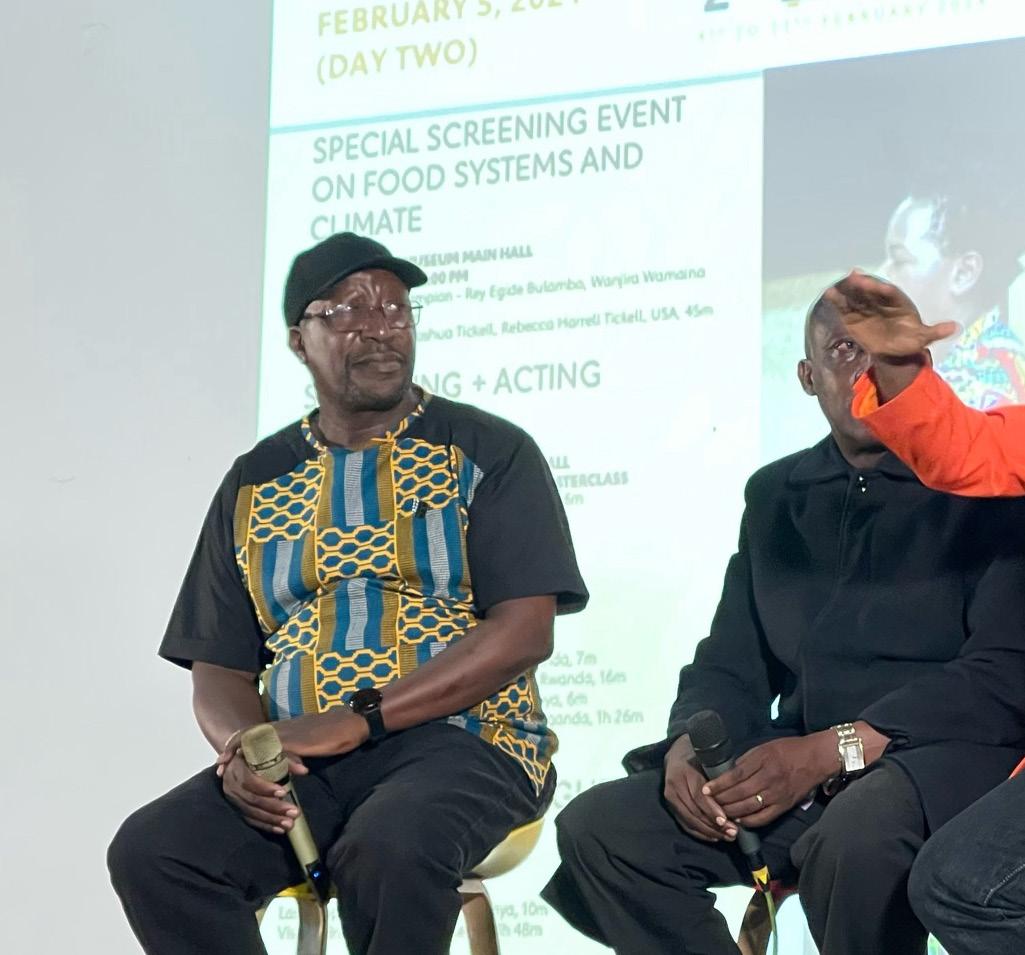
/OPENING NIGHT/
The opening night of the Kitale Film Week 2024 took place at the Kitale Museum on the 4th of February 2024. Two films i.e. Arthur Nsubuga’s Taama and Angela Wamai’s Shimoni, were screened. The event was hosted by Mudamba Mudamba, with key performances from Tamaduni Zetu band from Kitale. The main guests in attendance were Mr. Serge Noukoue (Embassy of France in Kenya and Somalia), Mr. Johnstone Kuya (Embassy of the Kingdom of the Netherlands in Kenya), and representatives from various sponsors and partners. The event included speeches from sponsors, the opening films and a panel discussion. Members of the panel, moderated by Mudamba Mudamba included Prof. Evans Mugarizi, Justin Mirichii, and James ‘Mshamba Zebedayo’ Chanji, who discussed at length the film industry in Kenya. The event started at 6pm and ended at 10pm. The total attendance was 326 people

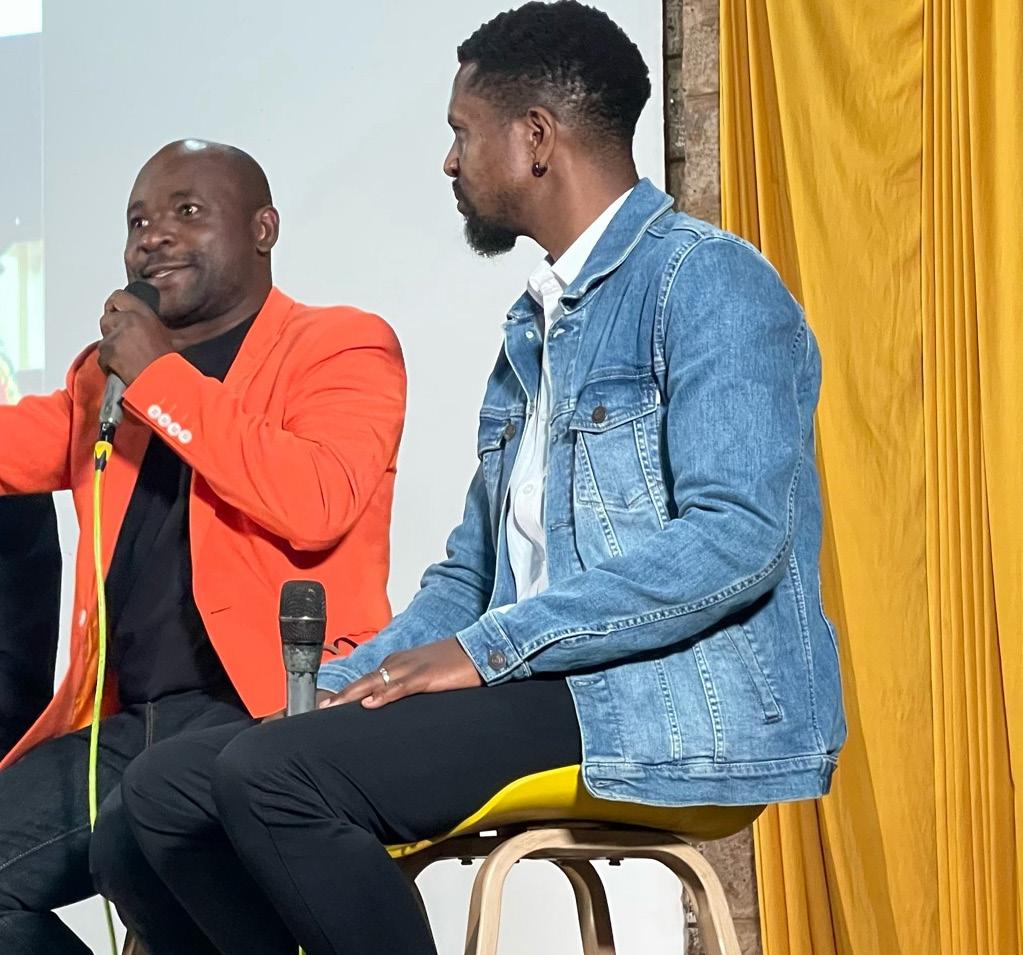
LESSONS LEARNED
• The event had no celebrity host like the previous year, but still attracted an audience to capacity.
• The audience appreciated the freshness of seeing a Ugandan film (most of them for the first time)
• The opening feature, Shimoni, was in Kikuyu language but audiences still found it relatable. Most stayed to the end although a number left the hall because it was getting late into the night.
• There was difficulty in finding an opening film that didn’t tackle such a heavy theme, although there was no negative reaction from the audience later.
• Absence of films and filmmakers from Trans Nzoia or Western Kenya continues to be a concern in the festival.
OPPORTUNITIES
• There’s chance for major improvements in the opening night organization in areas such as hosting, coverage, lighting and time management.
• Embrace filmmakers who also appear on local TV shows as part of the festival guests, to help local audiences to connect with the festival more easily.

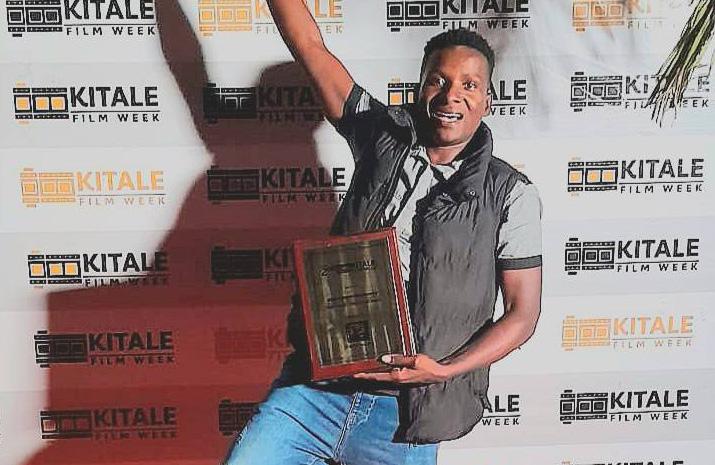
/COMPETITION AND AWARDS/
The film competition was conducted by calling for submissions through FilmFreeway. These submissions were filtered to a selection by the festival director after which the festival jury chose the nominees and winners for each category. The jury was led by Wangui Ngunjiri, Peter Kawa and Biko Nyongesa.
The total number of films submitted on FilmFreeway was 184.
The films selected were twenty (20) feature films, forty two (42) short films, nine (9) student films, four (4) animated films, and eleven (11) documentary films, a total of 86 films. The following is the full list of selected films:
NARRATIVE FEATURE FILMS
• Agonda - Bill Jones Afwani, KENYA, 1h 8m
• Atonement - Patrick Lorimo, UGANDA, 1h 30m
• Bangarang - Robbie Odongo, KENYA, 1h 29m
• Bazenga - Bilal Wanjau, KENYA, 53m
• Crystal - Leonard Amanya, UGANDA, 1h 35m
• Eastzuu - Clerik Morgan, KENYA, 1h 16m
• Gacal - Mohammed Ali, KENYA, 1h
• Lost in Time - Peter Kawa, KENYA, 1h 45m
• Medicine Man - Simiyu Barasa, KENYA, 2h
• Middle of Silence - Mutebi Andrew Elvis, UGANDA, 1h 26m
• Mtaa Yangu - Likale Muyonga, Trushna Patel, KENYA, 1h 49m
• Mukisa - Geoffrey Kasozi, UGANDA, 1h 30m
• Nalwawo - Eric Emokor, UGANDA, 1h 30m
• Omen - Baloji, DR CONGO, 1h 30m


• Pieces of Me - Nicholas Nsubuga, UGANDA, 1h 30m
• Rishai - Omar Hamza Hassan, KENYA, 1h 13m
• Shimoni - Angela Wanjiku Wamai, KENYA, 1h 37m
• Visasi - Bruno Oduor Tanya, KENYA, 1h 48m
• Why You Hate - Wanju Kase, KENYA, 1h
• Zahma - Mwinyi Mohammed Sururu, KENYA, 1h 22m
SHORT FILMS
• 15 Years Later (2022) - Sally Thitu Muiruri, USA, 16m
• 87th Victim - Daniel Mwendwa Muindi, KENYA, 12m
• Act of Love - Eric Mwangi, KENYA, 26m
• Closure - Sanchez Sanchez Marley, KENYA, 9m
• Corrupted File | A Charlie Charlie Found footage - Trevor Sagide Saisi, KENYA, 12m
• Here Ends the World we’ve known - Anne-Sophie Anne-Sophie Nanki, GUADELOUPE, 25m
• Influenced - Wanyuru Muiruri, KENYA, 11m
• Itifaki - Omar Hamza Hassan, KENYA, 9m
• Kanairo - Cecimercy Wanza, KENYA, 13m
• Kikulacho - Joshua Kasyu Wambua, KENYA, 6m
• Kimya - Omar Hamza Hassan, KENYA, 7m
• Last Supper - Karanja Ng’endo, KENYA, 10m
• Maama Wange - Masadde Isaa Yusuf, UGANDA, 10m
• Mairia : Encroaching Darkness - John Waiganjo Muriithi, KENYA, 29m
• Marry-Edge - Casper Anachoni, KENYA, 5m
• Melita - Daniel Mwendwa Muindi, Samuel Kariuki, KENYA, 30m
• Milango Zetu - Hillary Muchesia Ambalwa, KENYA, 13m
• Mirror Mirror - Sandulela Asanda, SOUTH AFRICA, 9m
• Mr 125 - Bruno Oduor Tanya, KENYA, 3m
• Mulika - Maisha Maene, DR CONGO, 14m
• My Dad’s Funeral - Mercy Wambui Kamau, KENYA, 14m
• Offline - Mucia Njeri, KENYA, 3m
• Orison - Trevor Saisi Sagide, KENYA, 19m
• Pieces of Us - Carl Gordon Mbaja, KENYA, 15m
• Reed - Tracy Gimase Amadi, KENYA, 4m
• Sandstorm City - Rey Egide Bulambo, DR CONGO, KENYA, 24m
• Seems Like Old Times - Ochieng Oneko, KENYA, 11m
• Somewhere to Stay - Ronald Owen, KENYA, 8m
• Spider - Peter Niwagaba, UGANDA, 19m
• Taama - Arthur Nsubuga, UGANDA, 15m
• Teka - Samuel Oduor Otieno, KENYA, 32m
• Terra Mater - Kantarama Gahigiri, RWANDA, 10m
• The Chasm - Jemima Wanja Kamanda, KENYA, 13m
• The Click - Cheruiyot Byegon Amos, KENYA, 7m
• The Collector - Andrew Evans Omolo, KENYA, 12m
• The Cut - Omar Hamza Hassan, KENYA, 8m
• The Package - Omar Hamza Hassan, KENYA, 6m
• The Whole Nine Yards - Victor ‘Viboks’ Omondi, KENYA, 14m
• Under the Bed - Kelvin Kagambo, TANZANIA, 15m
• Undugu - Victor Obok, KENYA, 22m
• Unspoken - Karanja Ng’endo, KENYA, 8m
• Where the River Divides - MD Neely, KENYA, 30m

STUDENT FILMS
• Bees - Tracy Muthoni Teta, KENYA, 26m
• Find Me Online - Brian ‘Vons’ Mukisa, UGANDA, 19m
• Kikulacho - Allan Kamau Kabesa, KENYA, 8m
• God Forbid - Yvan King Mukunzi, KENYA, RWANDA, 16m
• Kwani si Kesho? - Cheruiyot Byegon Amos, KENYA, 10m
• Mapacha - Artsy Solomon, KENYA, 7m
• Mistaken Identity - Fabby Grace Njongoro, KENYA, 1h
• Requiem Of Burden - Don Otieno Okinyi, KENYA, 5m
• Why Me? - Rey Egide Bulambo, KENYA, 17m
ANIMATED FILMS
• Kuhu and Babu: The Cult - Ross Franks, KENYA, 12m
• The King’s New Way - Steven Mochengo, KENYA, 4m
• Ttula - Mwesigwaa Benjamin Enoch, UGANDA, 7m
• Our territories, Our Voice - Beatrice Mutegi, KENYA, 8m
DOCUMENTARIES
• A Better World - Priscilla Muthoni, Dylan Habil, KENYA, 6m
• A Story of Bones - Joseph Curran, Dominic Aubrey de Vere, SAINT HELENA, 1h 35m
• Food Security Champion - Rey Egide Bulambo, Wanjira Wamaina Tabitha, KENYA, 5m
• Esther & the Law - Tatiana Scheltema, NIGERIA, THE NETHERLANDS, 1h 13m
• Kiswahili Kitukuzwe - Omar Kibulanga, KENYA, 15m
• Lobola, A Bride’s True Price? - Sihle Hlophe, SOUTH AFRICA, 1h 35m
• My Culture My Music - Fanney Tsimong, SOUTH AFRICA, 49m
• Sleeping Warrior - Janet Wells, Mwaura Timothy, KENYA, 1h 30m
• Suki - Pauline Namakwa, Nathaniel Mbugua, KENYA, 10m
• The Pink Champions - Omar Kibulanga, KENYA, 26m
• This Stolen Country of Mine - Marc Wiese, Carlos Andrés Vera, ECUADOR, CHINA, 1h 33m
Out of these films, the following were nominated for awards:
Best Feature Film:
• Bangarang - Nicholas Adongo, Kenya, 1h 29m
• Pieces of Me - Meme Kagga, Nana Kagga, Uganda, 1h 30m
• Mtaa Yangu - Likale Muyonga, Tracy Amadi, Edwin Wangai, Trushna Patel, Kenya, 1h 49m
• Shimoni - Wangechi Ngugi, Kenya, 1h 37m (WINNER)
• Mukisa - Meme Kagga, Nana Kagga, Uganda, 1h 30m
Best Documentary:
• Sleeping Warrior - Janet Wells, Mwaura Timothy, Kenya, 1h 30m (WINNER)
• The Pink Champions - Omar Kibulanga, Kenya, 26m
• Kiswahili Kitukuzwe - Omar Kibulanga, Kenya, 15m
• Bees - Tracy Muthoni Teta, Kenya, 26m
• Food Security Champion - Rey Egide Bulambo, Wanjira Wamaina Tabitha, Kenya, 5m
Best Screenplay:
• Shimoni - Angela Wanjiku Wamai, Kenya, 1h 37m (WINNER)
• Mukisa - Nana Kagga, Uganda, 1h 30m
• Bangarang - Robbie Odongo, Kenya, 1h 29m
• Pieces of Me - Nana Kagga, Uganda, 1h 30m
• Where the River Divides - Matthew Black, Kenya, 30m
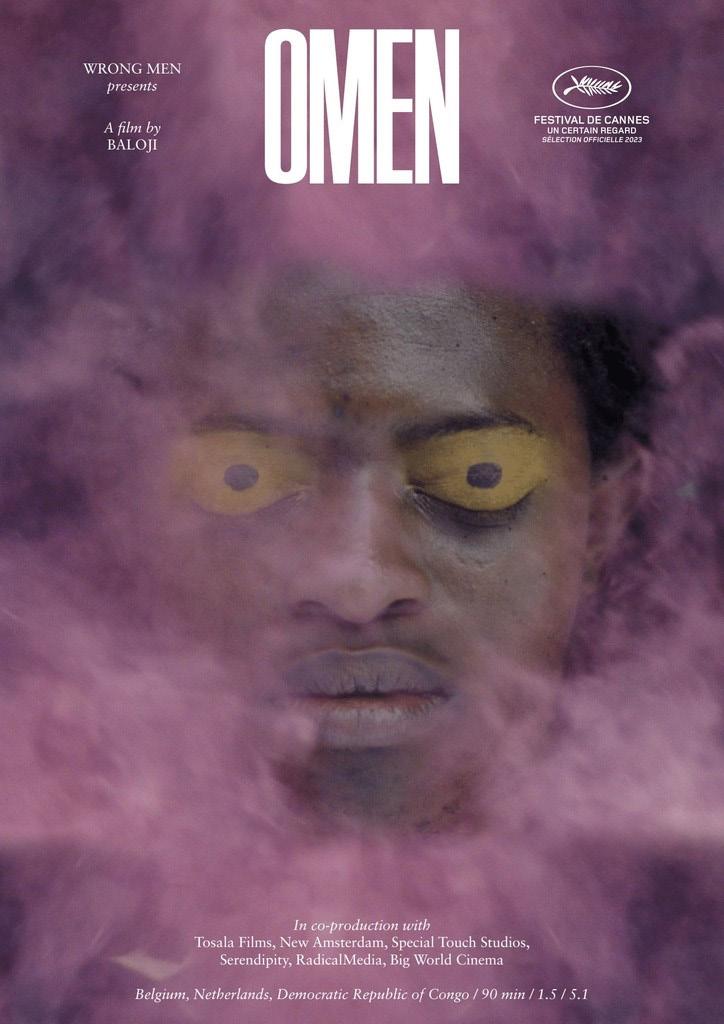
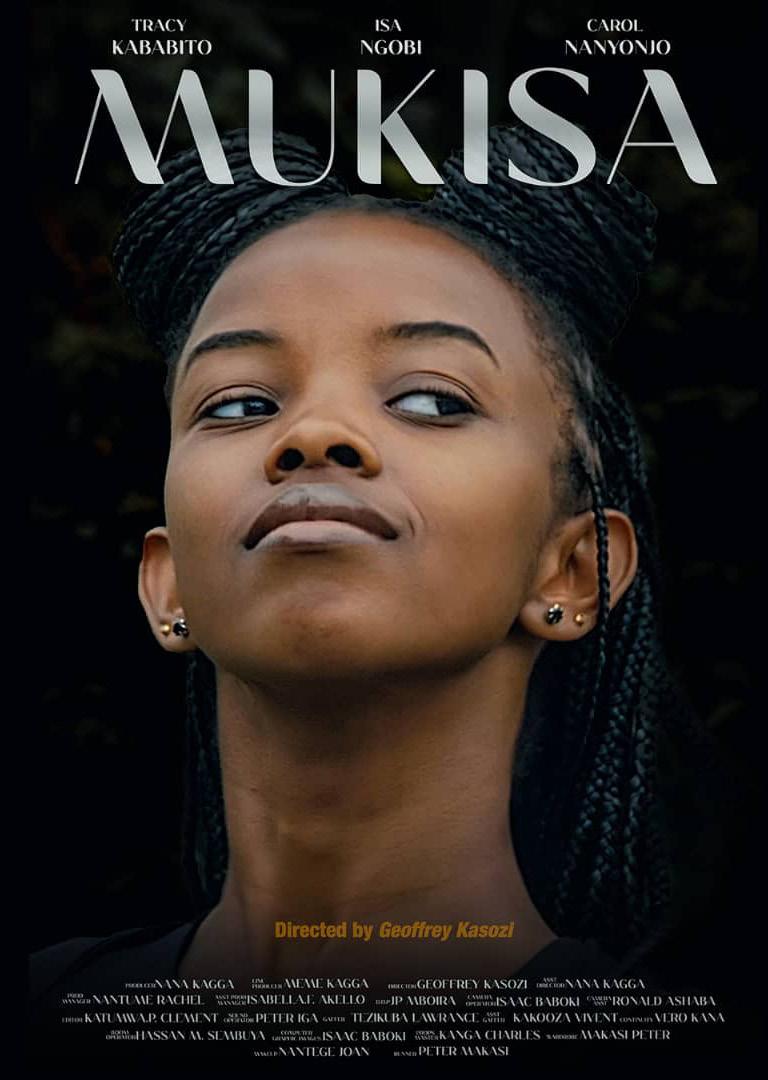
Best Cinematography:
• Mtaa Yangu - Victor Obok, Kenya, 1h 49m (WINNER)
• Shimoni - Andrew Mungai, Kenya, 1h 37m
• Pieces of Me - John Paul Mboira, Uganda, 1h 30m
• The Cut - Mohammed Ali, Kenya, 8m
• Where the River Divides - Andrew Bradford, Kenya, 30m
Best Editing:
• Pieces of Me - Katumwa Paul Clement, Uganda, 1h 30m
• Where the River Divides - Derek Hammeke, MD Neely, Kenya, 30m
• Rishai - Omar Hamza Hassan, Kenya, 1h 13m (WINNER)
• Taama - Arthur Nsubuga, Uganda, 15m
• Mtaa Yangu - Martin Muchiri, Kenya, 1h 49m
Best Short Film
• The Cut - Omar Hamza Hassan, Kenya, 8m
• Where the River Divides - Matrid Nyagah, MD Neely, Kenya, 30m (WINNER)
• Taama - Arthur Nsubuga, Uganda, 15m
• Spider - Peter Niwagaba, Uganda, 19m
• Itifaki - Omar Hamza Hassan, June Wairegi, Kenya, 9m
Best Student Film:
• Mistaken Identity - Decima Wesa, Kenya, 1h
• Requiem Of Burden - Don Otieno Okinyi, Kenya, 5m
• God Forbid - Lilian Wanjiku Wahome, Kenya, Rwanda, 16m (WINNER)
• Bees - Tracy Muthoni Teta, Kenya, 26m
• Kikulacho - Henry Mumo Muumbi, Kenya, 8m
The jury introduced a category for an audience choice award which invited the public to vote for a film among the nominees. The winner was:
• Food Security Champion - Rey Egide Bulambo, Wanjira Wamaina Tabitha, Kenya, 5m (WINNER)
Trophies were provided for six categories, all sponsored by the Kenya Film Commission. The categories were: best feature; best short film; best editing; best screenplay; best cinematography; and best documentary. The other categories did not receive a trophy.
LESSONS LEARNED
• The number of films selected was too high, which brought about programming challenges, especially when there were screening delays or technical issues.
• The awards ceremony was not well attended by nominees
• The awards ceremony lacked glamour and hype
• Certificates for awardes and nominees were not ready on the day of the ceremony
OPPORTUNITIES
• The festival needs to find a way to make the award ceremony and competition more streamlined with the festival, and more engaging or cut it off altogether.
• Reduce the number of films to ensure that every film is properly marketed and screened
• Explore ways to encourage nominees to attend
• Explore ways to increase submissions from Uganda

Beyond mere entertainment, the film week served as a platform for cultural exchange, dialogue, and understanding, reaching over six hundred people in five days though our special events. We had special screenings on:
FOOD SYSTEMS AND CLIMATE CHANGE
Monday, 5th February 2024, 10:00am, Kitale Museum - (hosted by young agribusiness management specialist Diana Atieno). Attendance: 121
Panelists included:
• Jack Wafula (SMART Initiative)
• Susan Mwihaki (Agripreneur)
• Polly Noice (Manor House Agricultural Centre)
• David Walala (Ecofix Consultancy Ltd)
• Samira Maruk (Climate change activist)
Films screened were:
• Kiss the Ground (2020);
• Food Security Champion (2023)
WOMEN IN LEADERSHIP
Tuesday, 6th February 2024, 10:00am, Kitale Museum - (led by Media Focus on Africa). Dubbed ‘Filamu za kina dada Uongozini’ it included the inspirational filmed journeys of Gladys Wanga, Cecily Mbarire, Dorice Donya, Cynthia Muge, Mumina Bonaya, Chief Carol, and Sabina Chege. Attendance: 289
Panelists included:
• Phanice Khatundi (CECM Agriculture, Trans Nzoia County + women rep candidate 2022)
• Sheila Chepkorir (Trans Nzoia Youths CBO)
• Hope Khaemba (Student Leader)
• Eva Nyamongo (Trans Nzoia Women Leaders)
• Naomi Okul (Maendeleo ya Wanawake)
• Frida Mtama (Mulembe Women CBO)
• Jane Bakasa (Tele Women CBO)
Films screened were:
• Donya: Voice of The People – Donya Dorice Aburi (MP): Kisii, Irene Mukonyoro & Debra Ngeru
• Genowa – Gladys Wanga (Governor): Homabay, Sandra Ruong’o & Wendy Kirorei
• The Force Within – Cecily Mbarire (Governor): Embu, Ashley Murugi & Joan Kabugu
• Etomononi Nagol – Caroline Ncharo – Kajiado (Asst. Chief), Cynthia Abdallah & Ivy Kagai/S. Imisa
HUMAN RIGHTS DEFENDERS
Wednesday, 7th February 2024, 10:00am, Kitale Museum - (hosted by Seth Masai).
Attendance: 75
Panelists included:
• Lucy Kibonei (Advocate)
• Dr. Sheila Olunga (Kitale County Hospital GBV department)
• Leonard Barasa (Director – Peace & Justice Trans Nzoia)
• Rev. Copernicus Mutoka (Kitale Christian Centre)
• Rose Obonyo (Child protection officer)
Films screened were:
• Esther & the Law - Tatiana Scheltema, Nigeria, The Netherlands, 1h 13m
/SPECIAL EVENTS/


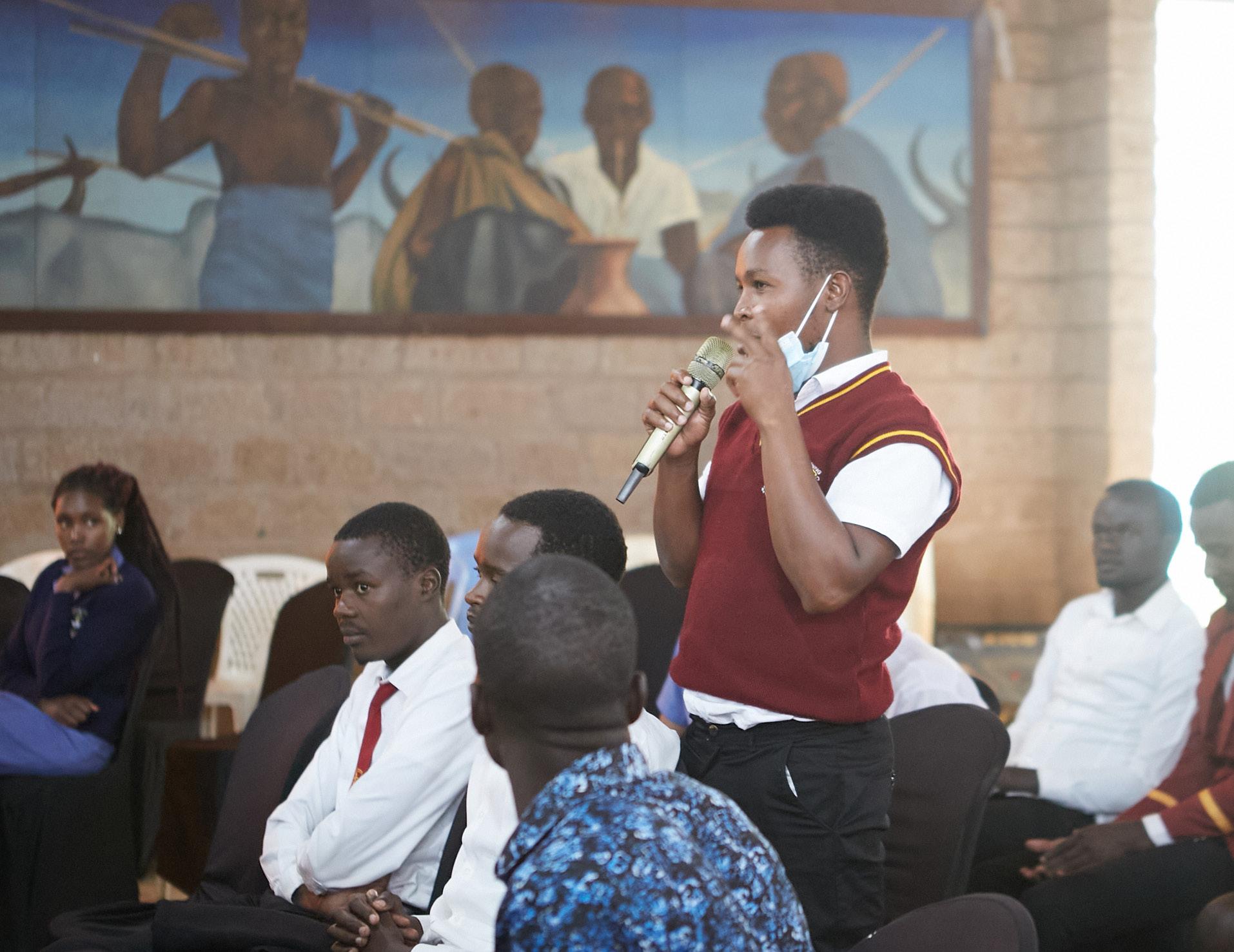

BREAST CANCER AND MENTAL HEALTH
Thursday, 8th February 2024, 10:00am, Kitale Museum - (hosted by Ms. Louise Mwezinane Chidzuga). Attendance: 142 Panelists included:
• Zedric Mafumbo (Psychiatrist)
• Elizabeth Sitawa (Person with Cancer)
• Cyprian Koech (Mental health Champion)
Films screened were:
• The Pink Champions - Omar Kibulanga, Kenya, 26m
• Act of Love - Eric Mwangi, Kenya, 26m
LAND AND AFFORDABLE HOUSING
Friday, 9th February 2024, 10:00am, Kitale Museum - (hosted by Donna Kimungui). Attendance: 94 Panelists included:
• Janerose Mutama (CECM Lands and Urban Planning, Trans Nzoia County)
• Leonard Barasa (Peace & Justice Trans Nzoia, Director)
Films screened were:
• Somewhere to Stay - Ronald Owen, Kenya, 8m
• This Stolen Country of Mine - Marc Wiese, Carlos Andrés Vera, Ecuador & China 1h 33m
These sessions sparked conversations, challenged perceptions, and inspired action, ultimately contributing to a more informed, engaged, and empathetic community. The average number of attendees per event was 136. The events were well attended by community leaders, including county government officials such as CECMs Phanice Khatundi and Janerose Mutama, and from various civil society organizations.
There was also a pre-valentine’s day event dubbed ‘LOVE, PIZZA & CINEMA’ which took place on Saturday, 10th February at the MegaBytes restaurant, with an attendance of forty (40) people. Films screened were:
• Pieces of Us - Carl Gordon Mbaja, Kenya, 15m
• The Whole Nine Yards - Victor ‘Viboks’ Omondi, Kenya, 14m
• Milango Zetu - Hillary Muchesia Ambalwa, Kenya, 13m
• Influenced - Wanyuru Muiruri, Kenya, 11m
• Seems Like Old Times - Ochieng Oneko, Kenya, 11m
• Marry-Edge - Casper Anachoni, Kenya, 5m
LESSONS LEARNED
• There was a limited number of films that were relevant to the topics of discussion, especially from East Africa
• The word-of-mouth means of marketing worked well to mobilize audiences
• Screening equipment posed a challenge because the projection was faint and some films could not be seen clearly.
OPPORTUNITIES
• Improve the hosting of the special events by appointing hosts who are knowledgeable on or interested in the subject matter
• Get panelists to see previews of films prior to the discussions
• Engage panelists and their organizations beyond the film festival


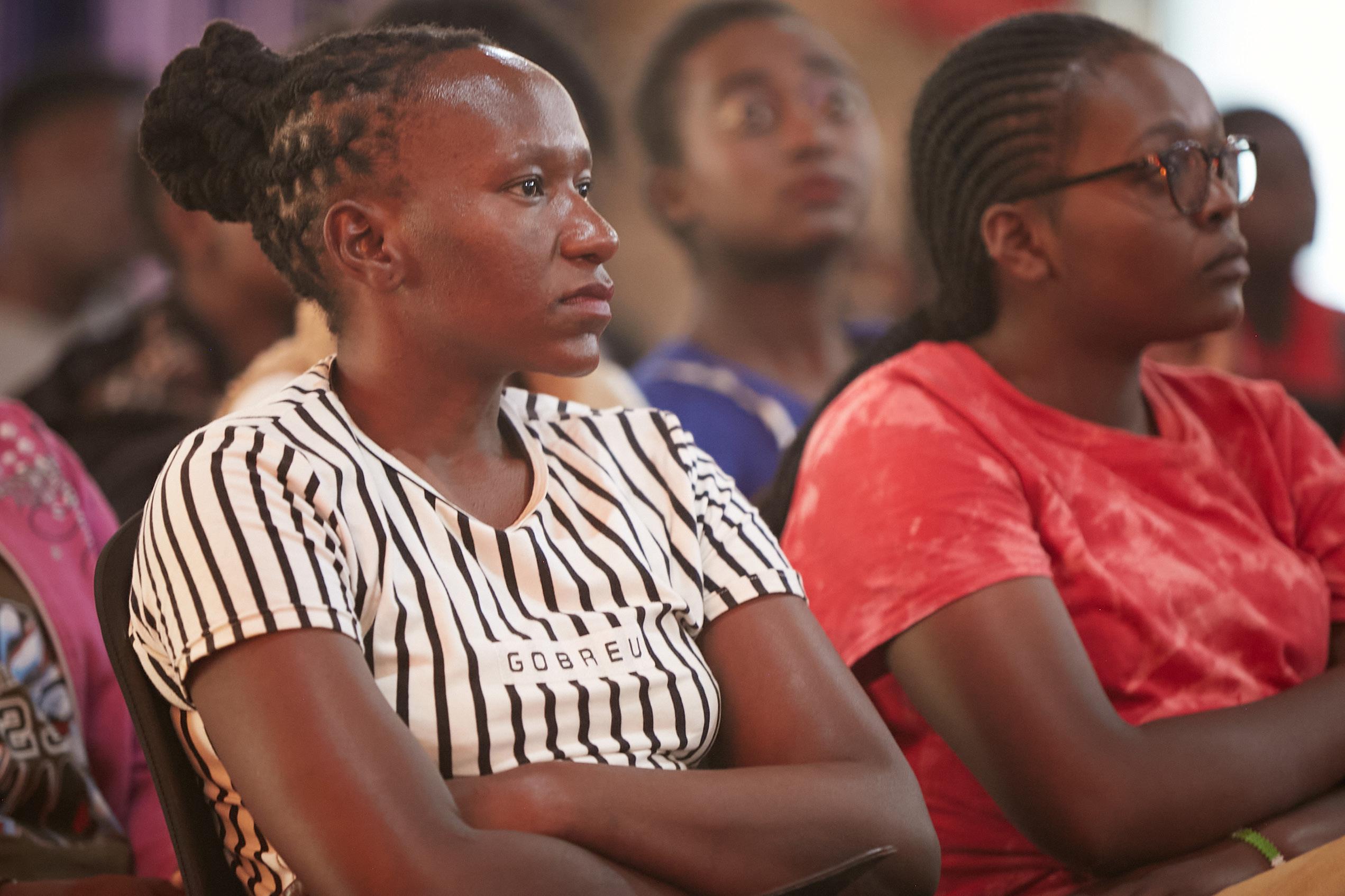
/REGULAR SCREENINGS/
The core of the Kitale Film Week is the screening of films from Kenya and Uganda. The regular film screenings happened from Monday, 5th February, to Friday, 9th February at the following venues:
• The Gific Hotel
• Kitale Museum (combined with masterclasses)
• The Pazuri Hotel
Screenings took place from 1:30pm and from 6:45pm daily. Screenings had an average of 6 people attending.
LESSONS LEARNED
• Attendance to regular screenings was extremely low
• Due to the number of films it was difficult to market individual titles
OPPORTUNITIES
• Reduce the number of films screened for easier marketing
• Explore venues that attract an audience easily

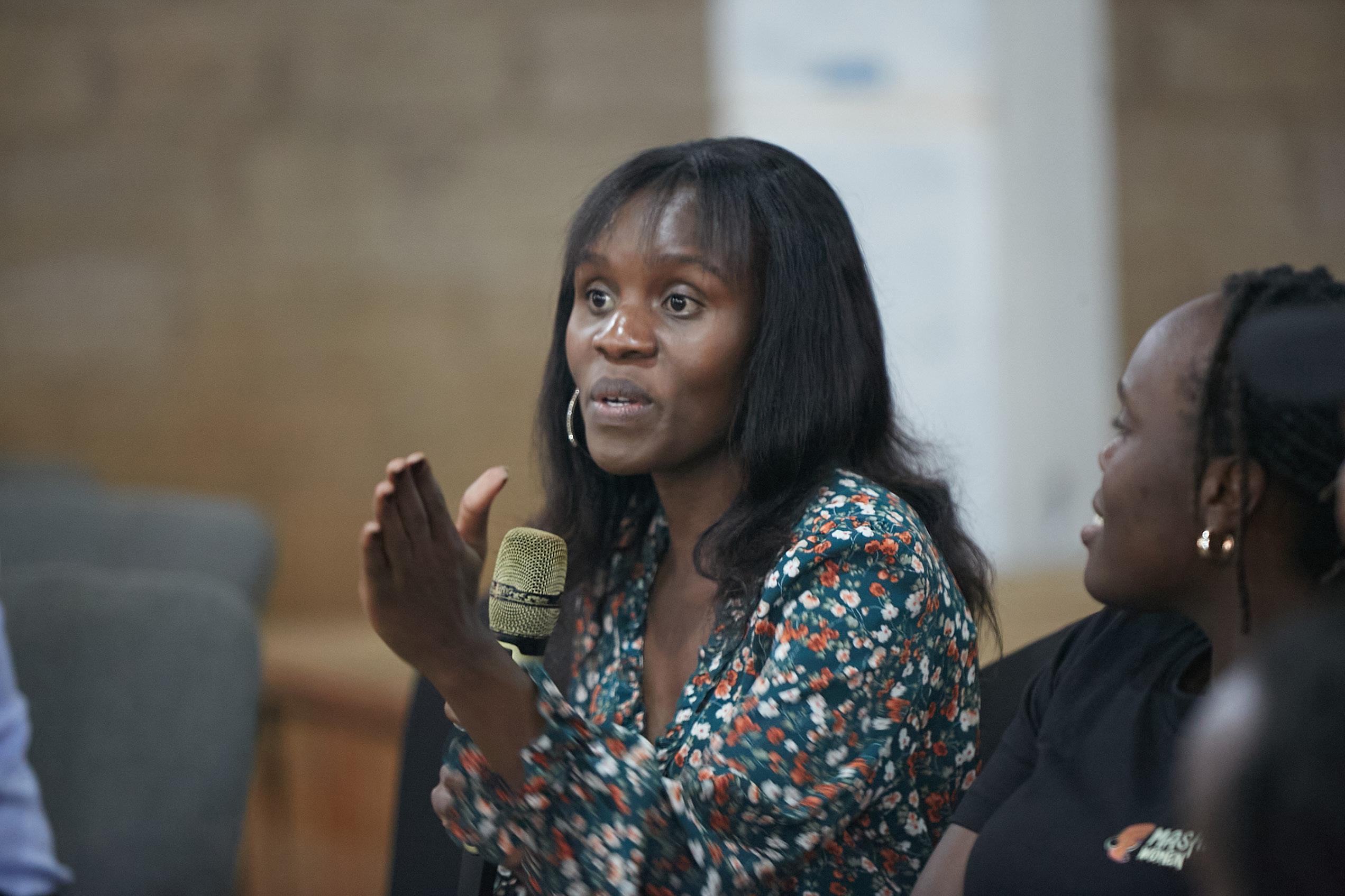
/MASTERCLASSES/
Masterclasses were conducted for five days at the Kitale Museum Education Hall, with an aim to impart skills and knowledge of the film industry to filmmakers within Trans Nzoia and also from neighbouring counties. The masterclasses lasted 2hours each day and were:
• Acting – Monday, 5th February 2024, 1pm – Mudamba Mudamba
• Film Directing – Tuesday, 6th February 2024, 1pm – Simiyu Barasa
• Documentary Filmmaking – Wednesday, 7th February 2024, 1pm – Filamu Dada Team
• Scriptwriting – Thursday, 8th February 2024, 1pm – Shelly Gitonga
• Film Producing – Friday, 9th February 2024, 1pm – Wambui Gathee The average attendance was 20 people.
LESSONS LEARNED
• Most willing learners are art groups which are based outside Kitale Town and faced transport and food challenges
• Facilitation resources and funds for masterclass trainers were lacking
• Local filmmakers within Kitale Town did not attend the masterclasses even though they were within the town
OPPORTUNITIES
• Explore ways to increase access and participation for local filmmakers
• Fundraise to enable trainers to travel and prepare accordingly
• Organise mini-trainings in the months leading to the festival

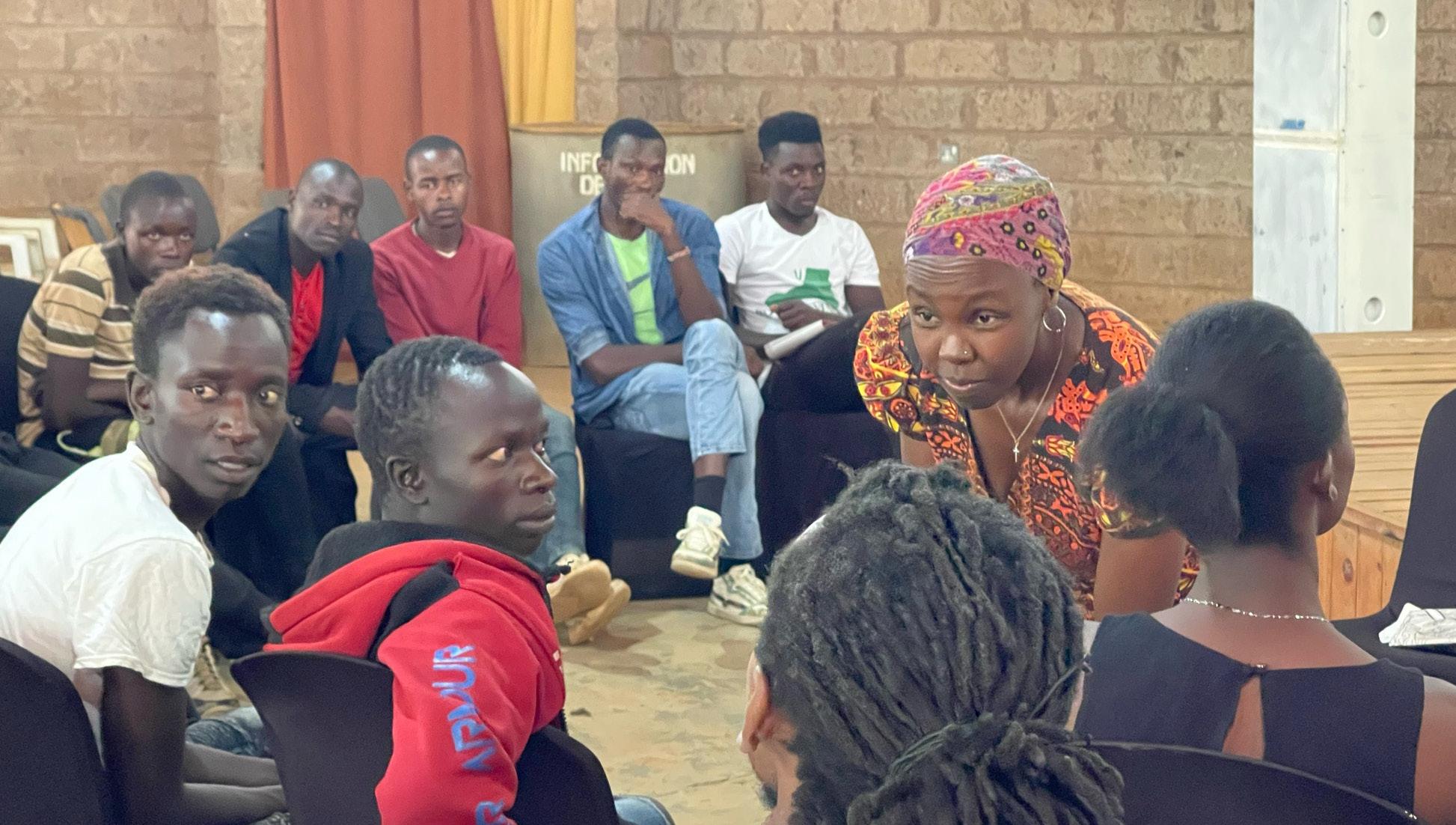



/OUTDOOR SCREENINGS/
Through our outdoor screenings, we are able to take films to the communities, helped by our partnership with Docubox EADFF who have provided the screening equipment since the 2023 edition. In 2024 we had six outdoor screenings, the sixth of which was a special partnership with the Kenya Film Commission who brought the Reel County Film festival to Kitale through this partnership. We carried out these screenings at the Kitale Railway Station grounds (Monday, Tuesday and Saturday), Kipsongo centre (Wednesday and Thursday), and Kisumu Ndogo (Friday). Approximate attendance to the outdoor screenings were as follows:
• Monday - 40
• Tuesday - 20
• Wednesday - 60
• Thursday - 50
• Friday - 70
• Saturday - 120
LESSONS LEARNED
• The quality of picture and sound played a huge role in audience retention
• The selection of films for outdoor screenings did not properly consider length and audience
• The itinerary nature of the outdoor screenings allowed different audiences to experience the films
• The kenya Film Commission event attracted a bigger audience due to better quality of picture and locally relatable films
OPPORTUNITIES
• Improve the picture and sound quality in future editions in order to enable audiences to get the best experience and watch films to the end.
• Schedule shorter films in the evenings
• Consider the language and themes for audiences prior to scheduling

PRIMARY SCHOOLS
Through partnership with Tunga Media Africa, we visited several schools during the week to showcase two impactful films, “Liyana” and “Supa Modo,” aimed at inspiring, educating, and entertaining young minds. A total of 1,343 students actively participated in the film screenings throughout the week, with engagements ranging from discussions to brainstorming sessions. The films captivated students and teachers alike, sparking insightful conversations and enhancing the learning experience beyond the traditional classroom setting.
SCREENING SCHEDULE AND PARTICIPATION
Monday:
Rayzon Schools: “Supa Modo” - 45 students
All Saints Academy: “Supa Modo” - 60 students
Tuesday:
Eva Educational Center: “Supa Modo” - 50 students
Wednesday:
St. Francis School for the Deaf: “Liyana” - 48 students
Showground Primary: “Liyana” - 600 students
Thursday:
Koi Koi Primary: “Supa Modo” - 350 students
Friday:
Kitale Family House of Hope: “Liyana” - 200 students
Saturday:
Family Screening at Kitale Museum: “Supa Modo” – 40 people
CHALLENGES FACED
Despite the enthusiasm and engagement observed during the screenings, several challenges were encountered:
• Time Constraints: Limited screening time (one hour per school) was insufficient for the full viewing of the films due to their length.
• Low Resources: Inadequate curtains in most schools resulted in sunlight interference, affecting the viewing experience.
• Power Outage: A power outage occurred during the screening at Koi Koi Primary, forcing an abrupt end to the session.
INTERVIEW INSIGHTS AND FEEDBACK
During the screenings, engaging discussions were held with teachers and students, providing valuable insights into the impact of cinema in education. Teacher Samuel Museti from Eva Educational Center highlighted the students’ high engagement levels during “Supa Modo,” emphasizing its role in enhancing self-efficacy and critical thinking skills. He noted how the film’s themes aligned with the curriculum, particularly in communication and collaboration. Teacher Maryann Ngetich from St. Francis School for the Deaf advocated for the integration of films into education, emphasizing the importance of incorporating sign language interpreters to ensure inclusivity.
/SCHOOL
SCREENINGS/

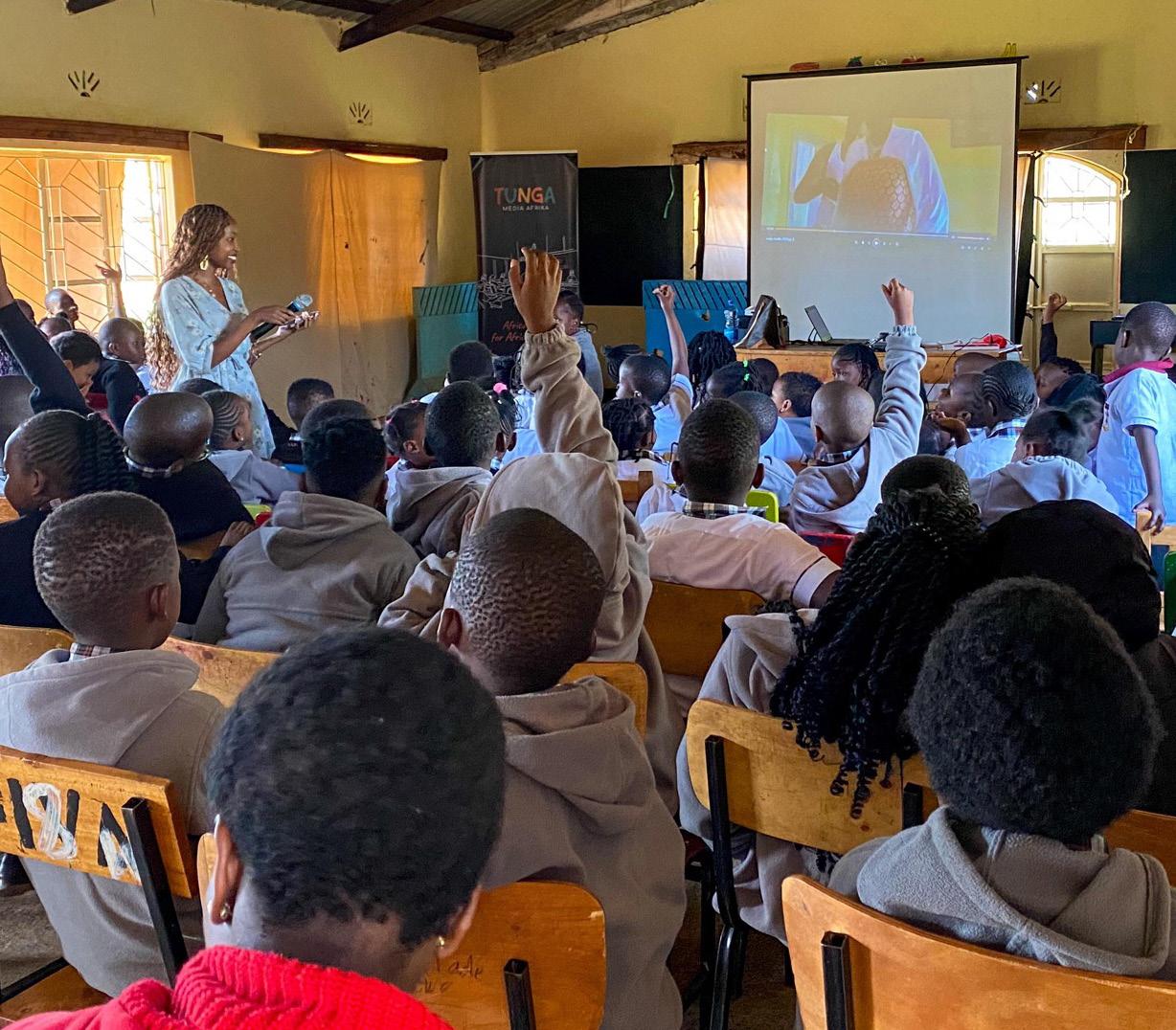
THEMES EXPLORED:
“Supa Modo”:
Imagination and Escapism; Community and Solidarity; Sibling/Family Dynamics; Health Science-Hospital setting and Medication; Means of transport; Economic activities; Forms of Communication-Verbal and Non-verbal cues; Photography; Prayer; Sports; Emotions; Cultural diversity-Traditional events,Use of local dialect; Sounds; Use of Costumes
“Liyana”:
Imagination and Creativity; Cultural Representation-Naming traditions,Use of local dialect; Family Bonds; Farming-Poultry farming,Animal rearing; Forms of Abuse; Parental neglect; Orphanhood; Diseases-Sexually Transmitted Diseases(HIV)
The Kitale Film Week served as a valuable platform for promoting cultural exchange, fostering critical thinking,social-emotional learning and enhancing visual literacy among primary school students in Kitale. Despite logistical obstacles, the event succeeded in igniting curiosity and sparking dialogue on important social issues depicted in the films. Moving forward, addressing logistical challenges and expanding resources will be crucial in ensuring the success and sustainability of similar initiatives in the future.

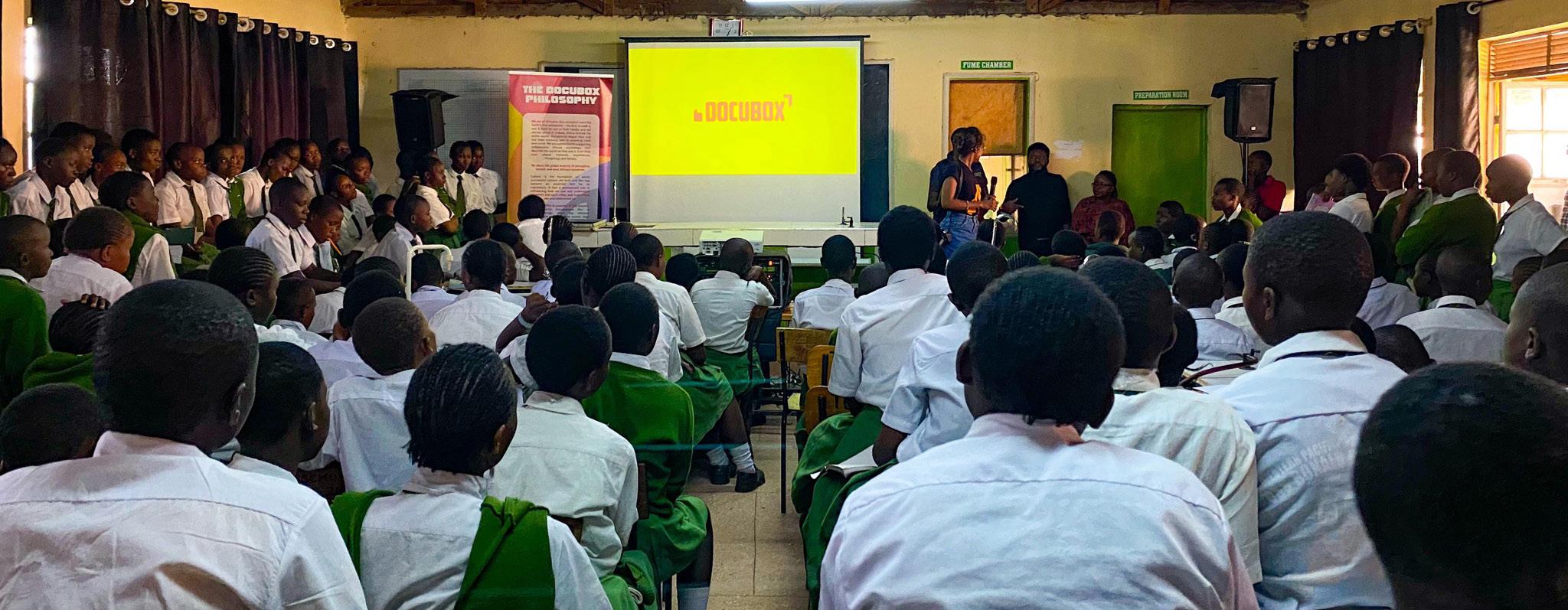
The school program also reached high school students within Trans Nzoia. Sponsored and led by Docubox, the high school programme focused on for climate-centric screenings in the schools they identified during this festival.
These screenings were executed between the 5th - 10th of February with three films that were relevant to the young audiences as below:
• River of Brown Waters (Kenya) by Laissah Malih
This is the life of Ewaso Ng’iro river, the various forms of lives it supports and the threats all these lives intertwined face.
• The Forest Guardian (Uganda/Kenya) by Anthony Ochieng (Tony Wild) Ssezi’s heart, mind and soul has been in the forest for more than fifty one years. He has managed a forest that has so far been a refuge for sixty Chimpanzees and is an important wildlife corridor between Budongo and Bungoma Forest.
• Dunia Bora (Kenya) by Dylan Habil
The short documentary takes viewers on an immersive journey through Ol Pejeta’s sprawling habitats, with a key focus on the critically endangered rhinoceros and the adverse effects of climate change. Explore the intricate relationship between this iconic African habitat and the people, as we follow the dedicated efforts to protect these majestic creatures in their natural environment as a testament for climate action and coexistence.
The programme toured the following schools:
• Kwanza Girls High School – Kitale – 800 students
• Tuwan Girls Secondary School – Kitale – 500 students
• Sitatunga Secondary School – Kaplamai, Cherangany – 300 students
• Wiyeta Girls Secondary School – Kipsaina – 260 students
• St. Joseph’s Girls High School – Kitale – 68 students
The high school programme reached a total of 1,928 students.
LESSONS AND OPPORTUNITIES
• We were able to reach young diverse audiences in Trans Nzoia County through our partnership with Docubox and Tunga Media Afrika across five secondary schools.
• The students we reached were drawn to the topic of climate change and environmental issues, where the three films presented to them gave them a better understanding of the issue at hand and the action they need to take to combat it.
• The films shown proved to be relevant because of the engagement we had thereafter and the students were able to compare and contrast with their surroundings and current situation in Trans Nzoia.
• For future screenings, there’s need to engage contact persons for schools early enough in order to maximize on the potential of reaching more schools and more audiences.
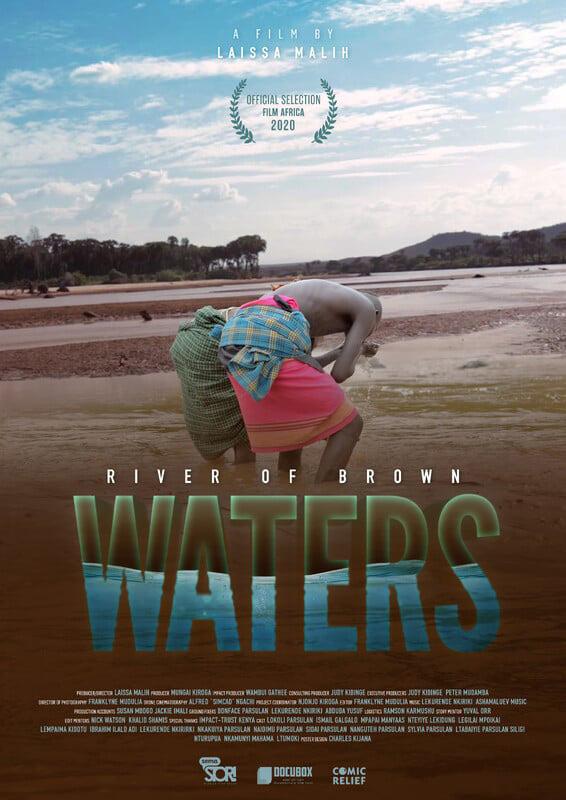

“I am filled with an overwhelming sense of pride and joy at the incredible progress our creative community in Trans Nzoia has made over the past two years,”
-
CECM Chanelle J. Kittony at the closing night of the Kitale Film Week 2024
The closing night took place at the Deep Sea Resort for the second successive year. The plan has always been to have a relaxed evening by the poolside where the audience can watch films with their feet in the pool. However, for two successive years there have been sudden weather changes on the final day and the event ended up being rainy and chilly. A total of 318 people attended the closing night, but because of the rain the number reduced as the event went on.
The closing night was hosted by Ambrose Nguti, and it involved film screenings, awards, entertainment, and speeches from guests who included:
• Ms. Truphosa Amere Awuor, HSC – The County Secretary of Trans Nzoia
• Ms. Chanelle J. Kittony – Member of the County Executive Committee of Trans Nzoia County in charge of Gender, Youth, Sports, Culture and Tourism
• Ms Jane Gitau – Green Belt Movement and Chevening Kenya Alumni Chair Emeritus
• Dr. Dawson Mudenyo – Director of Faith Diplomacy in the Office of the First Lady of the Republic of Kenya
• Mrs. Naomi Tembo Karani – Chairperson of the Trans Nzoia Tourism Association
The films screened were:
• Kimya – Omar Hamza
• Itifaki – Omar Hamza
• Mvera – Daudi Anguka
Coast province based filmmaker Daudi Anguka was at the closing night to present his film, and he encouraged filmmakers to embrace local stories, and the county to support the film industry and initiatives such as the Kitale Film Week. Also present were filmmakers from Uganda, Congo, The Netherlands and the Kakuma refugee camp.
LESSONS LEARNED
• The weather affected the plan for the closing night for the second year in a row which casts doubt on the idea of an outdoor closing night.
• The award ceremony had no glamour and was not well attended
• The venue organization and lighting could be improved
• Coverage of the closing night was limited
• Audiences appreciated the choice of film for the closing, and many stayed and watched till the end.
OPPORTUNITIES
• Consider an alternative venue and format for the closing night
• Review the awarding ceremony and find ways to make it more exciting and significant
/CLOSING NIGHT/

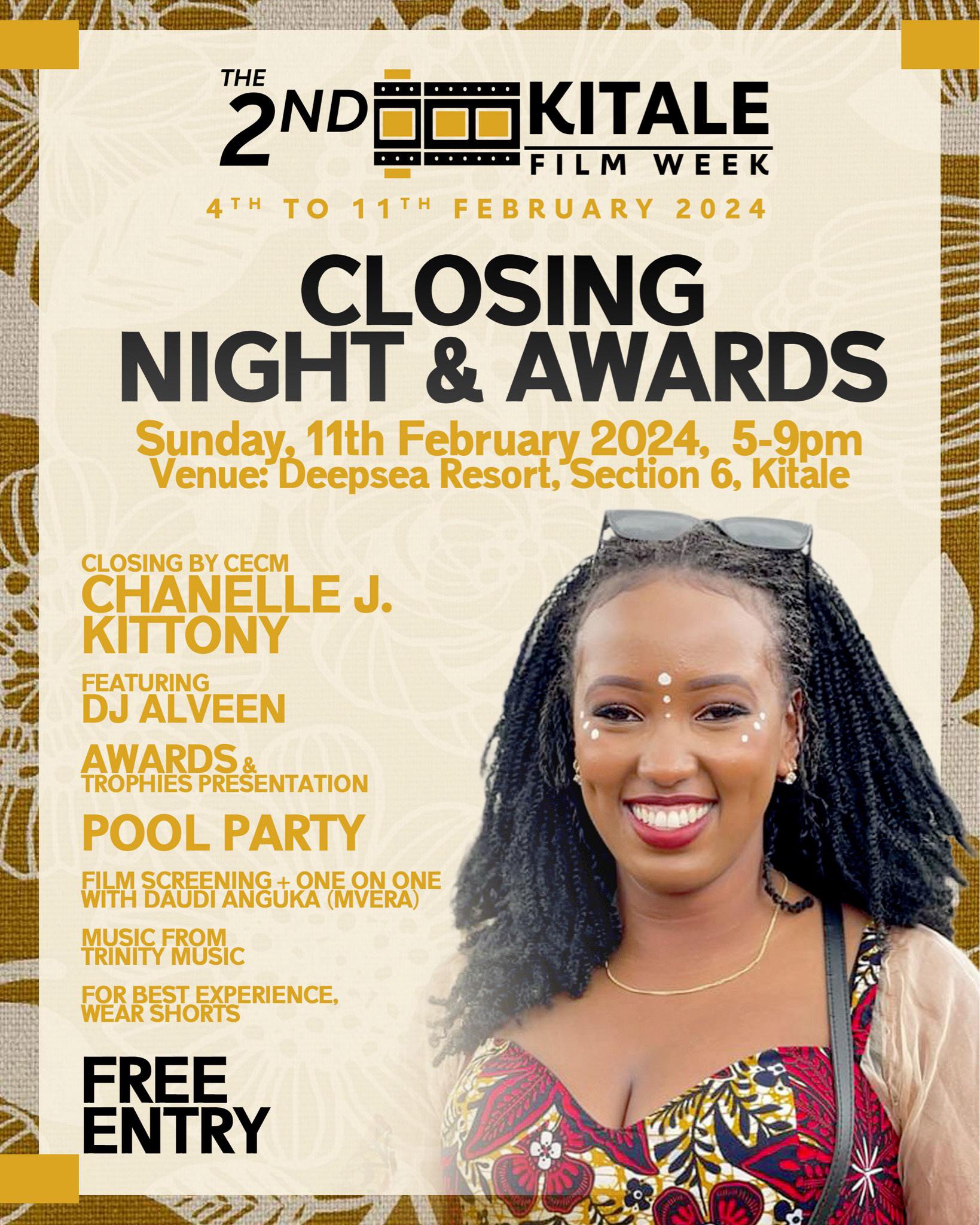

/MARKETING AND PUBLICITY/
Marketing for the Kitale Film Week 2024 was done on Digital, offline, and traditional media such as radio and newspapers.
The social media marketing team posted regularly from September about the Kitale Film Week on:
• LinkedIn
• Facebook Page
• Facebook Group
• Twitter (X)
• Instagram
• Google
There were also two twitter chats which resulted in the festival becoming a trending topic in Kenya for two days.
The Kitale Film Week was also featured in the following publications among several others:
Nation
October 3, 2023 - Kitale Film Week opens portal for submissions
https://nation.africa/kenya/life-and-style/weekend/kitale-film-week-opensportal-for-submissions-4384758
Kenya Broadcasting Corporation
January 15, 2024 - Kitale Film Festival unveils 2024 lineup
https://www.kbc.co.ke/kitale-film-festival-unveils-2024-lineup/
Daily Express Uganda
September 18, 2023 - Kitale Film Week opens film submissions for 2nd edition 2024
https://dailyexpress.co.ug/2023/09/18/kitale-film-week-opens-filmsubmissions-for-2nd-edition-2024-festival-committee-announced/
Luo Tunes Uganda
September 18, 2023 - Kitale Film Week Opens Portal For Submissions For Second Edition, Announces 2024 Festival Committee
https://luotunes.com/2312/Kitale-Film-Week-Opens-Portal-For-SubmissionsFor-Second-Edition-Announces-2024-Festival-Committee
Pulselive Kenya
September 18, 2023 - Kitale Film Week announces 2nd edition, how Kenyan & Ugandan filmmakers can participate
https://www.pulselive.co.ke/entertainment/movies/kitale-film-weekannounces-2nd-edition-how-kenyan-and-ugandan-filmmakers-can/2s3ygcb

Nairobi News
February 24, 2024 - Film on forgiveness “Where the River Divides” triumphs at Kitale film week
https://nairobinews.nation.africa/film-on-forgiveness-where-the-river-dividestriumphs-at-kitale-film-week/
Kenya News Agency
February 7, 2024 - Trans Nzoia Residents Urged To Embrace Climate Friendly Agricultural Practices
https://www.kenyanews.go.ke/trans-nzoia-residents-urged-to-embraceclimate-friendly-agricultural-practices/
Sanaa Post
September 20, 2023 - The Kitale Film Week is on!!
https://news.sanaapost.com/the-kitale-film-week-is-on/
Buzz Central
September 22, 2023 – Call for Submissions for Second Edition of Kitale Film Week
https://buzzcentral.co.ke/2023/09/call-for-submissions-for-second-edition-ofkitale-film-week/
Sinema Focus
January 14, 2024 - Kitale Film Week 2024 Lineup: ‘Shimoni’ and ‘Mvera’ Unveiled As Opening and Closing Films
https://www.sinemafocus.com/kitale-film-week-2024-lineup-shimoni-andmvera-unveiled-as-opening-and-closing-films/
Afrocritik
January 15, 2024 - Kitale Film Week Unveils 2024 Lineup
https://www.afrocritik.com/kitale-film-week-unveils-2024-lineup/
INFLUENCERS AND TWITTER CHATS
Our social media team was led by Silder Mayieka who coordinated the hashtags and trends. The activation on Day 4 of #KitaleFilmWeek2024 was a roaring success! With the support of influencers, our hashtag soared to the second position in Kenya trends, garnering 2.6k tweets and engaging 1.5k users. The campaign reached an astounding potential audience of 10.9M, amplifying the festival’s message far and wide.
This trend was repeated on the closing day, trending at number 3 in Kenya alongside the phrase ‘Experience Difference’ which is one of the festival slogans.
DIRECT MARKETING
We used roadshows with our team of volunteers wearing the yellow festival t-shirt which had clear print “IN FEBRUARY WE WATCH FILMS”. We also used word of mouth through phone calls, Whatsapp messages and peer invitations to get people to attend events and screenings. We also used email, mainly when sending out press releases to journalists, and communicating with filmmakers and other stakeholders.
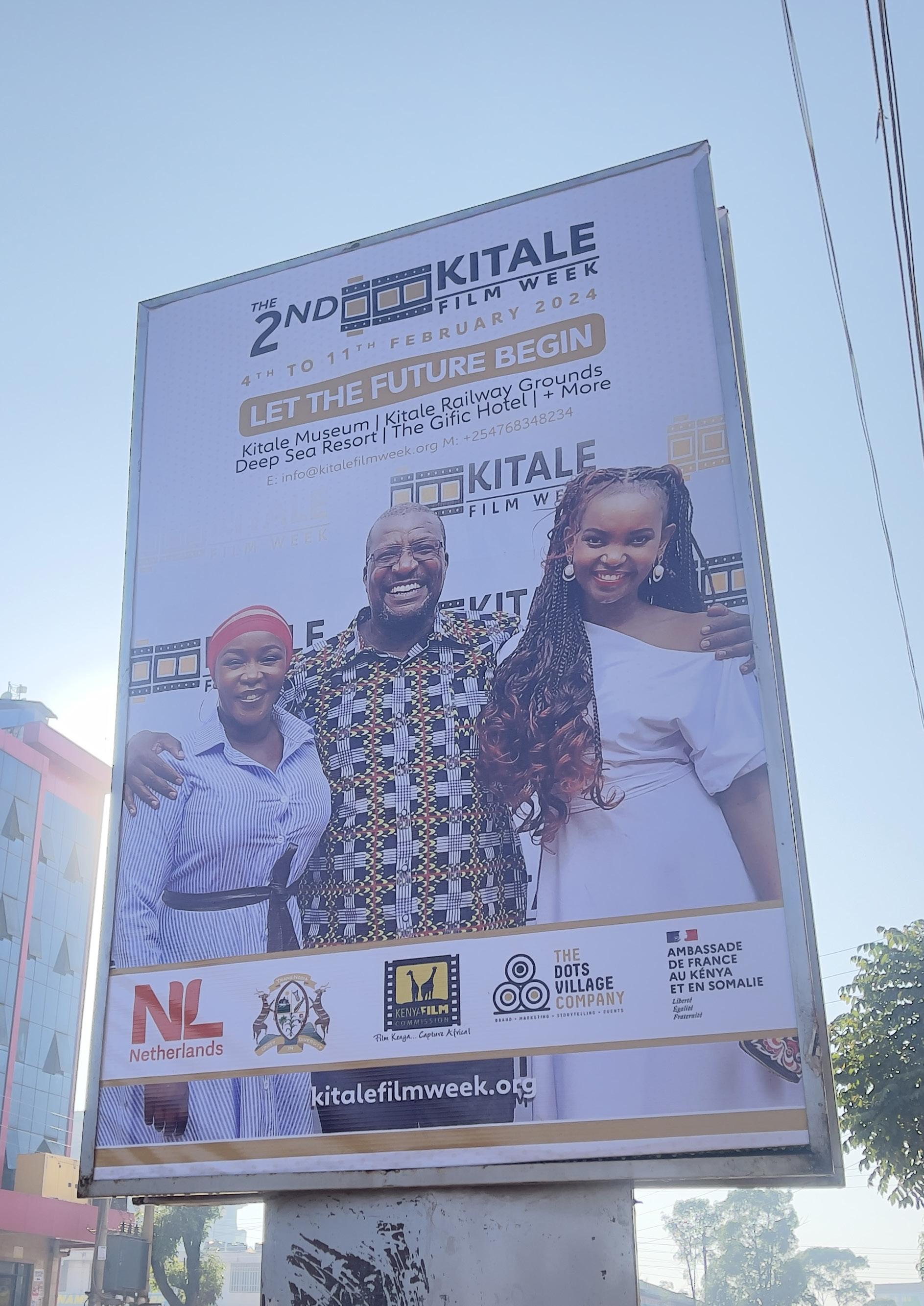
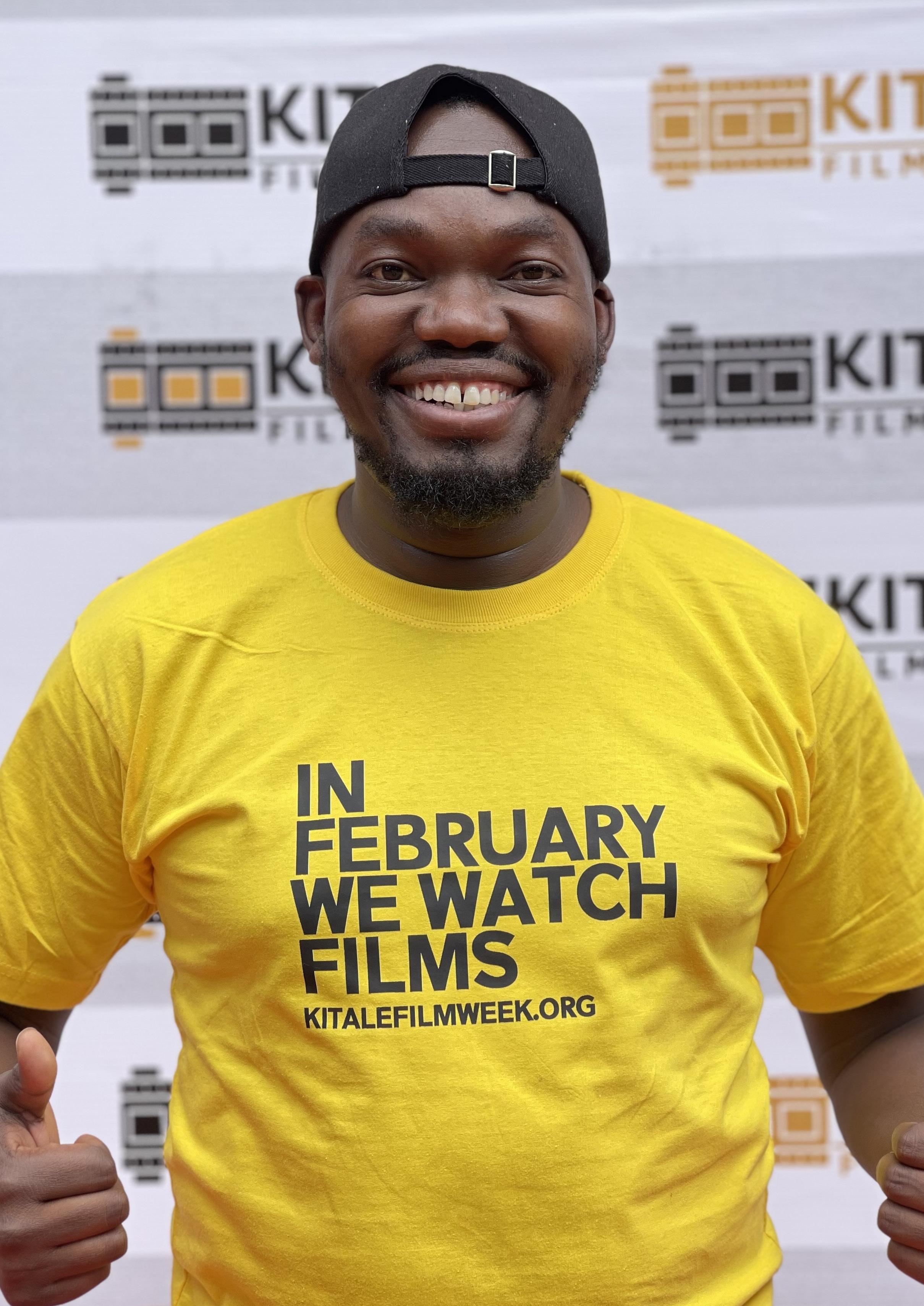

RADIO
The film week was advertised on radio and spoken about in interviews with Mercias Kipsoi of BK Radio, and Godricks Wanyonyi of Transwest Digital Network.
PRINTED MATERIAL
The festival printed banners, t-shirts, flyers and street billboards to enhance the reach of our communication.
LESSONS LEARNED
• Leveraging influencers and community engagement fostered a vibrant online dialogue, highlighting the festival’s significance in promoting regional filmmaking and sustainable development.
• Social media reach was high especially when messages went out to all platforms at the same time consistently.
• Our Facebook pages got hacked at the end of the festival, locking us out of this platform.
• Low finances meant we were unable to renew our website subscription when it expired, locking us out of both the website and the official email address.
• The use of reels daily on social media increased engagement from online audiences
OPPORTUNITIES
• Moving forward, continued collaboration with influencers and grassroots efforts will be key to sustaining momentum and achieving broader goals of artistic collaboration and cultural exchange.
• Make use of radio more as a large population in Trans Nzoia listens to the medium
• Ensure there’s a good financial plan for website and email maintenance to prevent total blackouts
• Create new Facebook page and enhance the security to prevent future hacking
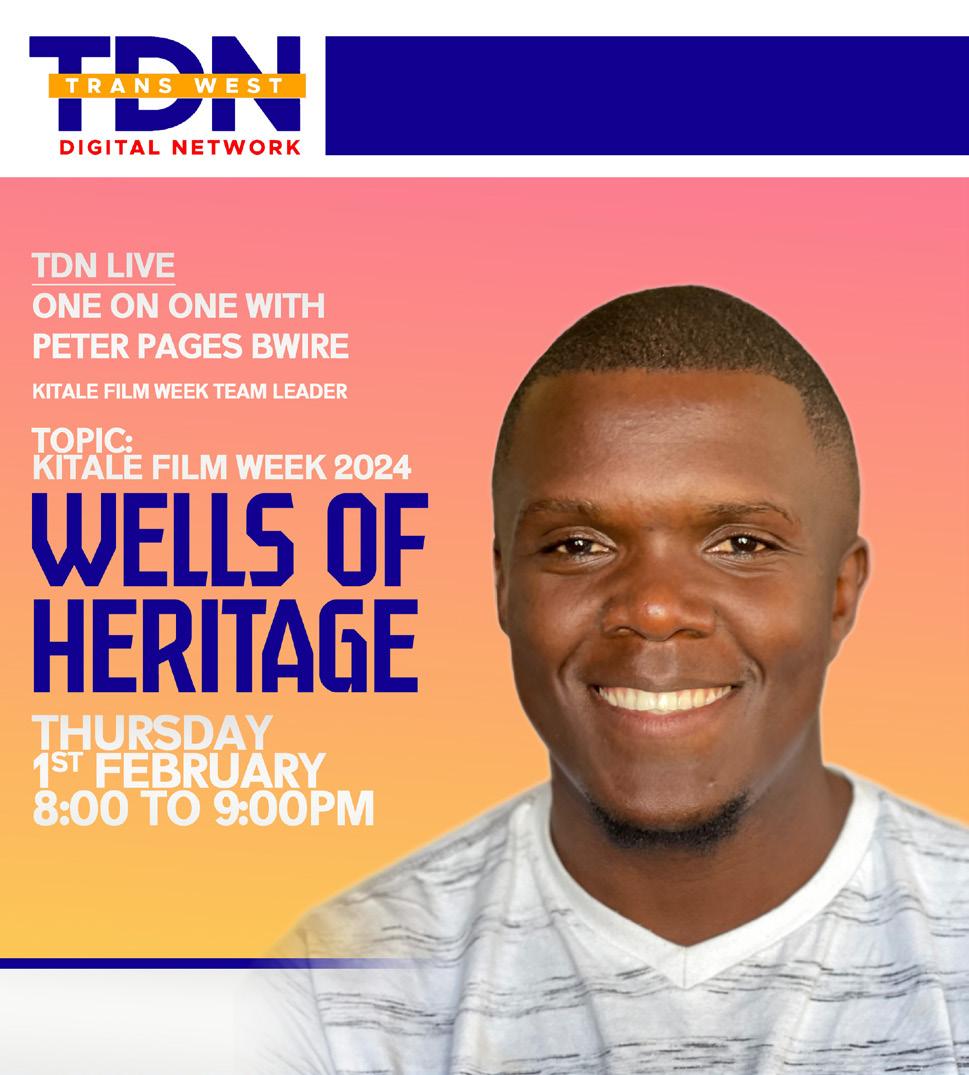

/DIVERSITY AND INCLUSION/
The Kitale Film Week has intentionally cultivated a culture of diversity across demographics, cultures, races, religions, age, gender, abilities, etc.
We have done this through:
• Forming a festival team that represents different kinds of people
• Programming to target a diverse audience
• Ensuring diverse representation among speakers, presenters, and panelists
• Selecting films that showcase many ethnicities, genders, abilities, and other diverse groups. We prioritize inclusion over quality of material, to enable the work of marginalized storytellers to be seen.
• Selecting venues and times that make the event accessible to individuals of all abilities. There’s room for improvement in this area although Kitale has a very limited pool of venues to choose from.
• Incorporating cultural sensitivity into the event planning process
• Promoting language inclusivity in event materials and communication. We use English in major communications, Kiswahili on radio and roadshows, and attempt to adapt to various communities when we come into contact with them.
• We have methods in place to gather input from diverse stakeholders within and outside Trans Nzoia
• The Kitale Film Week contributes to educating attendees on diversity and inclusion topics
/NEXT EDITION/
The next edition of the Kitale Film Week is scheduled to happen from 2nd to 8th February, 2025.
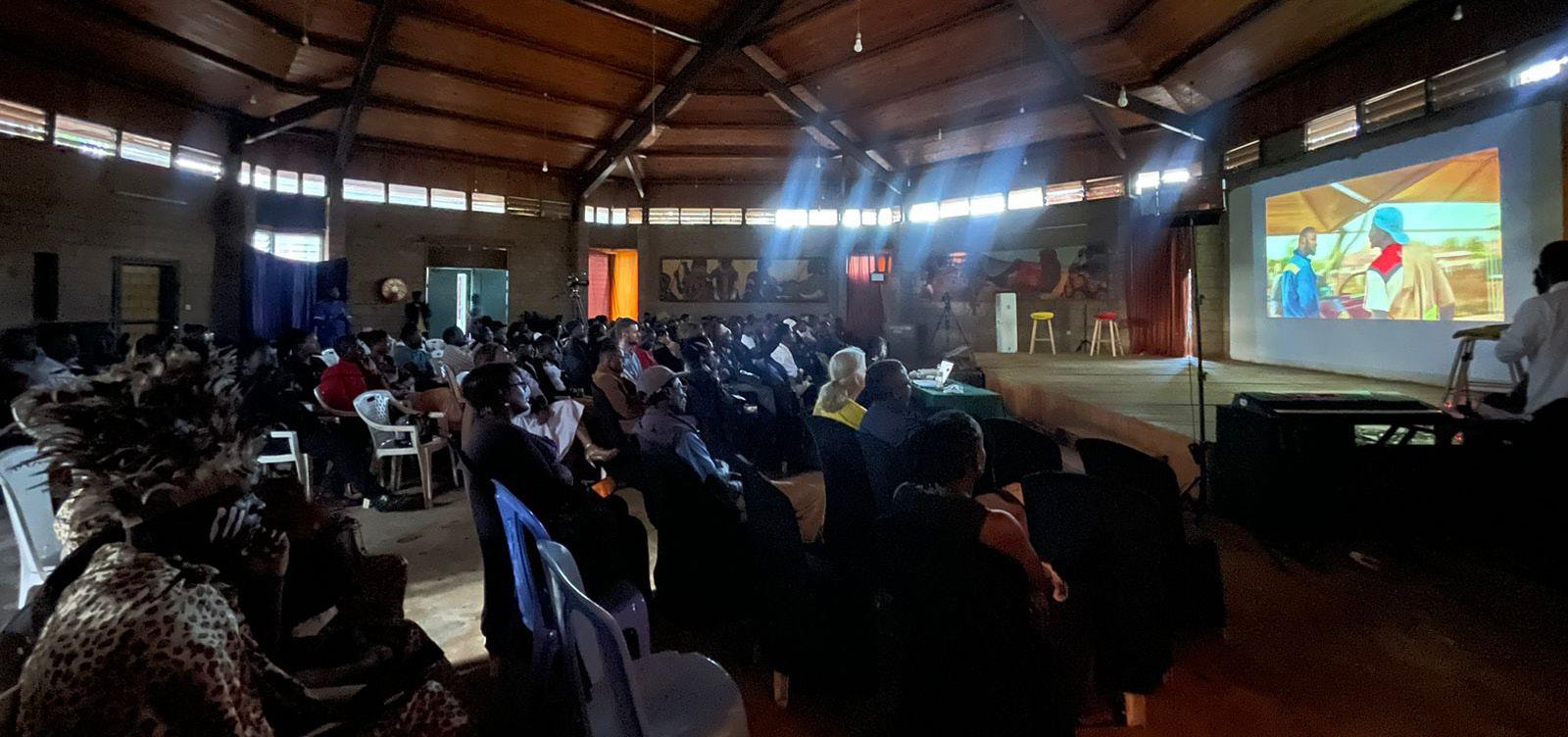












 BY BRENDA NANJALA KHAOYA Special Screenings Coordinator
BY BRENDA NANJALA KHAOYA Special Screenings Coordinator































